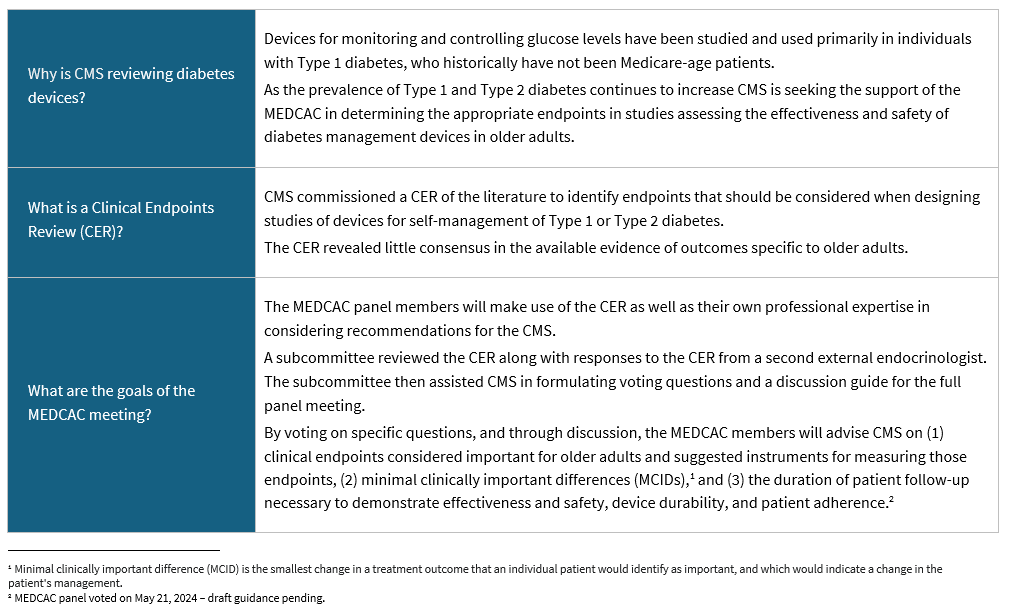In Memory of Yossi Elaz We are deeply saddened to share the news of Yossi…
MEDCAC Clinical Evidence Review: Impact on New Medical Devices
Commercializing a new medical device involves navigating a complex landscape of regulatory, payer and provider considerations. For some devices, one critical component of this process is the review by the Medicare Evidence Development and Coverage Advisory Committee (MEDCAC), which can significantly influence go-to-market and reimbursement plans.

Referral to the MEDCAC
The MEDCAC serves as an independent panel of experts convened by the Centers for Medicare & Medicaid Services (CMS) to evaluate the clinical evidence and coverage implications of certain medical technologies. The MEDCAC comprises clinicians, researchers, patient advocates, and other stakeholders with diverse expertise in healthcare delivery and evidence-based medicine.
Examples of when CMS might request a review by MEDCAC include:1
- Evaluating evidence for emerging technologies. CMS may ask the MEDCAC to evaluate the available evidence on the clinical effectiveness, safety, and cost-effectiveness of a new medical device, especially when the published studies are limited (e.g., small sample size, limited demographics, etc.), or contain methodological flaws (e.g., short-term end points, inappropriate data analysis, etc.).
- Determining coverage policies. Advise CMS whether establishing or revising a coverage policy is warranted.
- Addressing controversial issues. In cases where the use of the technology is the subject of public controversy, the MEDCAC can opine on the benefits of the item or service, and important considerations, such as the required competence of providers that would affect the determination of whether the item or service is “reasonable and necessary” under the Social Security Act.
The MEDCAC has reviewed evidence assessing clinical outcomes and cost-effectiveness of diverse medical devices, such as continuous glucose monitoring (CGM) systems used in the management of diabetes, implantable cardioverter defibrillators (ICDs) used to monitor patients at risk of sudden cardiac arrest, and deep brain stimulation (DBS) devices used to treat Parkinson’s disease and other movement disorders.
The MEDCAC Review Process
The MEDCAC review process typically involves the submission of evidence by multiple stakeholders, including device manufacturers, professional societies, and healthcare providers. The members of the MEDCAC assess the strength of the evidence in an open forum and make recommendations to CMS as to the potential impact of the technology on patient care and healthcare resource utilization2.
Typical questions commonly considered by MEDCAC include:
- Does the evidence (e.g., clinical trials, real-world studies, post-market surveillance, etc.) support the device’s efficacy and safety?
- What are the potential short-term and long-term clinical outcomes (e.g., morbidity, mortality, quality of life, and functional status, etc.) associated with the device?
- What are the limitations of the available evidence (e.g., gaps, biases, methodological limitations, etc.)?
- What are the economic implications of adopting the device into clinical practice?
Example: Diabetes Self-Management Devices3
CMS has requested the MEDCAC recommend specific outcome measures in studies including Medicare population with insulin-dependent Type 1 and Type 2 diabetes, which may differ from those used in studies conducted in support of approval by the U.S. Food and Drug Association (FDA).

MEDCAC’s Impact on Launching New Medical Devices
The MEDCAC review process can have a profound impact on the successful launch and adoption of new medical devices:
- Need for strong evidence. Manufacturers must generate robust clinical evidence to support their devices’ efficacy and safety, as MEDCAC’s scrutiny of this evidence will ensure that new devices meet rigorous standards of clinical validity and relevance.
- Coverage determinations. MEDCAC’s recommendations to CMS can directly affect coverage decisions by Medicare.
- Market adoption. The outcome of reviews by MEDCAC can shape stakeholders’ perceptions of new medical devices. Positive assessments may enhance clinicians’ confidence when considering adoption of the technology, while negative reviews may raise concerns about its clinical utility and reimbursement prospects.
- Regulatory considerations. MEDCAC’s assessments may affect FDA decisions (e.g., post-market surveillance requirements).

About Boston MedTech Advisors (BMTA):
Since 2004, BMTA’s multidisciplinary team of highly experienced consultants has supported more than 400 medical technologies and life sciences companies around the world to achieve their business goals. BMTA assists its clients to commercialize new products and services and increase their market adoption, by addressing their unique and inter-dependent regulatory, clinical, reimbursement, marketing, and business development requirements. BMTA offers valuable, ethical, result-oriented, professional, and cost-effective insights that recognize the multi-faceted aspects of today’s healthcare markets and the client’s unique business needs.
For more information, questions, or comments, contact us at info@bmtadvisors.com
Follow us on LinkedIn.
References:
- https://www.cms.gov/medicare-coverage-database/view/medicare-coverage-document.aspx?MCDId=10
- https://www.cms.gov/medicare/regulations-guidance/advisory-committees/evidence-development-coverage
- https://www.cms.gov/medicare-coverage-database/view/medcac-meeting.aspx?medcacid=81&doctype=all&timeframe=30&sortBy=updated&bc=20

